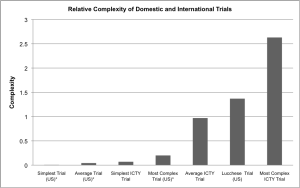[Dr. Chantal Meloni teaches international criminal law at the University of Milan is an Alexander von Humboldt Scholar at Humboldt University of Berlin.]
1. A new complaint (technically a
Communication under art. 15 of the Rome Statute) has been lodged on the 10
th of January to the Intentional Criminal Court, requesting the Prosecutor to open an investigation into the denounced abuses committed by UK military forces against Iraqi detainees from 2003 to 2008.
The complaint has been presented by the British Public Interest Lawyers (
PIL), representing more than 400 Iraqi victims, jointly with the Berlin-based European Centre for Constitutional and Human Rights (ECCHR).
The lawyers’ allegation is that grave mistreatments, including torture and other degrading abuse techniques, were commonly used during the six years in which the UK and Multinational Forces operated in Iraq.
According to the victims’ account the mistreatment was so serious, widespread and spanned across all stages of detention as to amount to “systemic torture”. Out of hundreds of allegations, the lawyers focused in particular and in depth on eighty-five cases to represent the mistreatment and abuses inflicted, which would clearly amount to war crimes.
2. This is not the first time that the behaviour of the UK military forces in Iraq is challenged before the ICC. In fact, hundreds of complaints have been brought on various grounds both to domestic courts and to the ICC since the beginning of the war. As for the ICC, after the initial opening of a preliminary examination, following to over 404 communications by Iraqi victims, in 2006 the ICC Prosecutor issued a first
decision determining not to open an investigation in the UK responsibilities in Iraq. According to that decision, although there was a reasonable basis to believe that crimes within the jurisdiction of the Court had been committed, namely wilful killing and inhumane treatment, the gravity threshold was not met. Indeed the number of victims that had been taken into account at that time was very limited, totalling in all less than 20 persons, so that the Prosecutor found that the ‘quantitative criteria’, a key consideration of the ICC prosecutorial strategy when assessing the gravity threshold, was not fulfilled.
Therefore, what is there new that in the view of the lawyers warranted the re-proposition of such a request? In the first place it shall be noted in this regard that during the eight years that passed since then many more abuse allegations have emerged (see the Complaint, p. 110 ff.). Most notably, hundreds of torture and mistreatment allegations show a pattern - spanning across time, technique and location - which would indicate the existence of a (criminal) policy adopted by the UK military forces when dealing with the interrogation of Iraqi detainees under their custody.
In the words of the lawyers, “it was not the result of personal misconduct on the part of a few individual soldiers, but rather, constituted widespread and systematic mistreatment perpetrated by the UK forces as a whole”.

